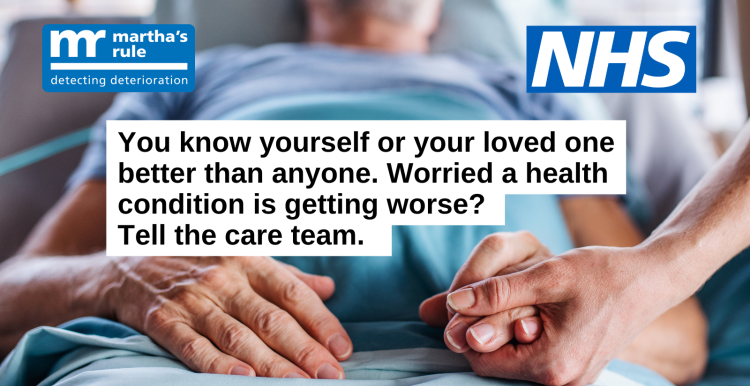Call for Concern — Martha's Rule

What is Martha’s Rule?
Martha’s Rule is a major patient safety initiative providing patients and families with a way to seek an urgent review if their or their loved one’s condition deteriorates and they are concerned this is not being responded to. Phase 1 of Martha’s Rule is being piloted across 143 sites.
Martha’s Rule helps spot early warning signs of deterioration.
As well as regular patient checks, hospital staff will ask at least daily if patients are feeling better or worse to monitor any unexpected changes in their condition.
Martha’s Rule gives patients and their loved ones the right to request a rapid review with a specialist clinical team if you're worried about a health condition getting worse.
You know yourself or your loved one better than anyone.
You may notice small changes before they show up in routine measurements. Telling the care team about these changes can help them detect deterioration early, so they can take action to prevent more serious health problems.
If you notice changes which could suggest a health condition is getting worse, please tell any of the staff looking after you or your loved one.
If, after speaking to the care team, you remain worried and feel your concerns are not being addressed, call for a rapid review.
Some changes that you may notice before anyone else:
- The patient seems different to usual (not themselves)
- Breathing differently
- Sweating or unusual skin colour
- Reduced urine output or not passing urine
- More sleepy than usual or confused
- Hands feel cold or very hot
- In pain and looks uncomfortable
- You are worried about their condition.
When to call for a rapid review (Call for Concern):
- you have ongoing concerns after you have spoken to the ward nurse or doctor
- there is a noticeable change in your own, or the patient's condition and the ward team is not recognising your concern.
Martha's Rule in North East London
Please be aware that Martha's Rule is a pilot initiative currently rolled out by 143 hospitals across the country. In North East London, Homerton, Whipps Cross (Curie and Primrose Wards) and Newham hospitals are able to offer rapid reviews.
- Homerton University Hospital: 07557 157 464
- Whipps Cross Hospital (Curie and Primrose Wards): 07919211646
- Newham Hospital: 07821666852
- King George Hospital: 01708 435000 and then ask the operator to bleep 8513.
- Queen's Hospital: 01708 435000 and then ask the operator to bleep 8513.
Signs of deterioration to look out for in children
To help the care team detect the early signs of deterioration, please tell someone if your child:
- Has a temperature – sweating or hot or cold to the touch
- Has a high pitched or abnormal cry
- Has any changes to the appearance of their skin (pale, rash or sores/blisters).
- Is less responsive or floppy, difficult to wake
- Is irritable and will not settle
- Is not interested in feeding / drinking or eating
- Is breathing faster than normal, grunting with each breath or wheezing
- Is weeing much less or has blood in their poo
- Or about anything that worries you that isn’t like your child usually
Great Ormond Street Hospital for Children: 020 3655 5969
Patient Advice & Liaison Service (PALS)
Please contact the Patient Advice & Liaison Service (PALS) if you have any other concerns regarding the care that you or a relative or friend is receiving, that has not been resolved by talking with the ward team.


